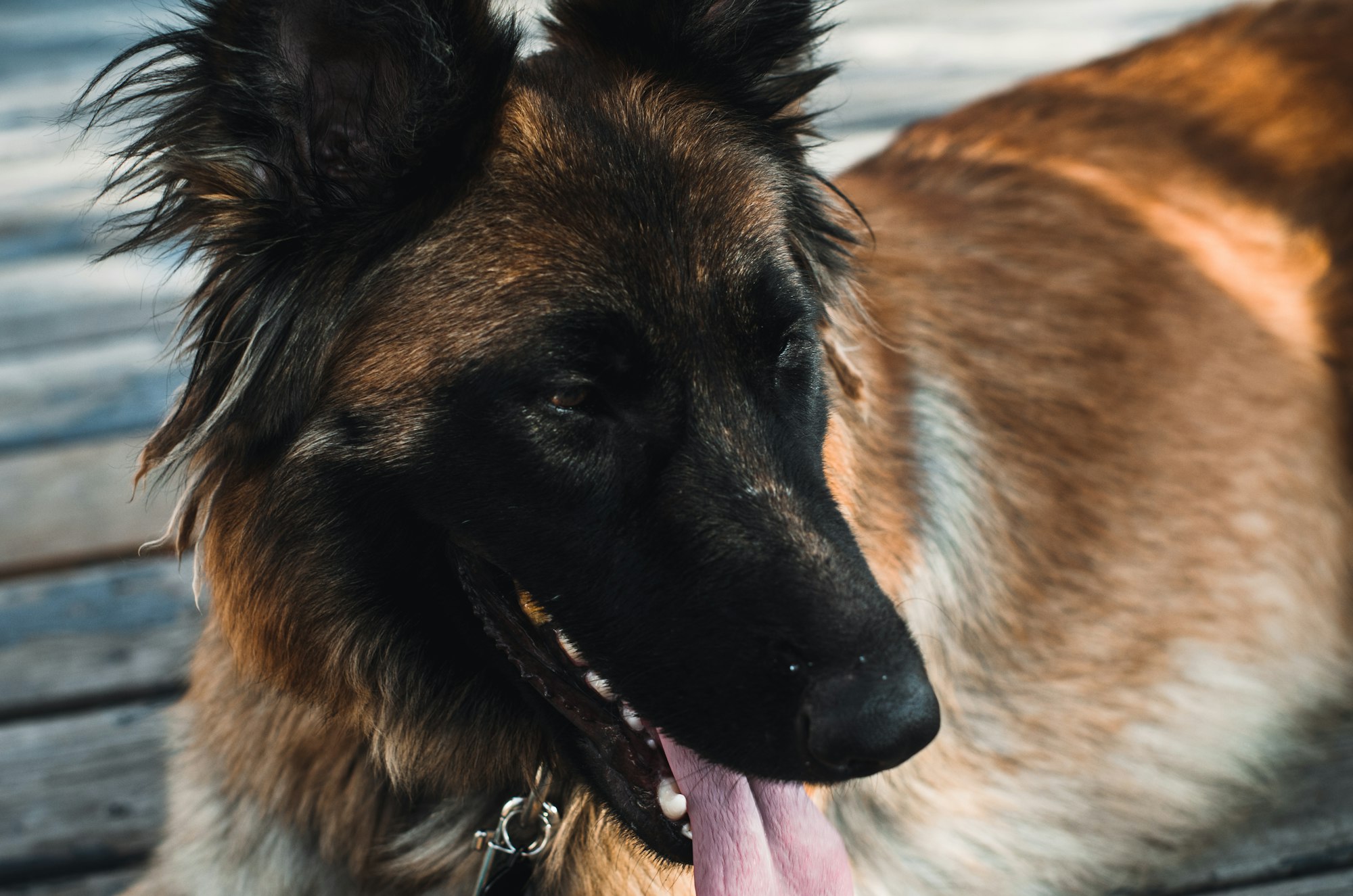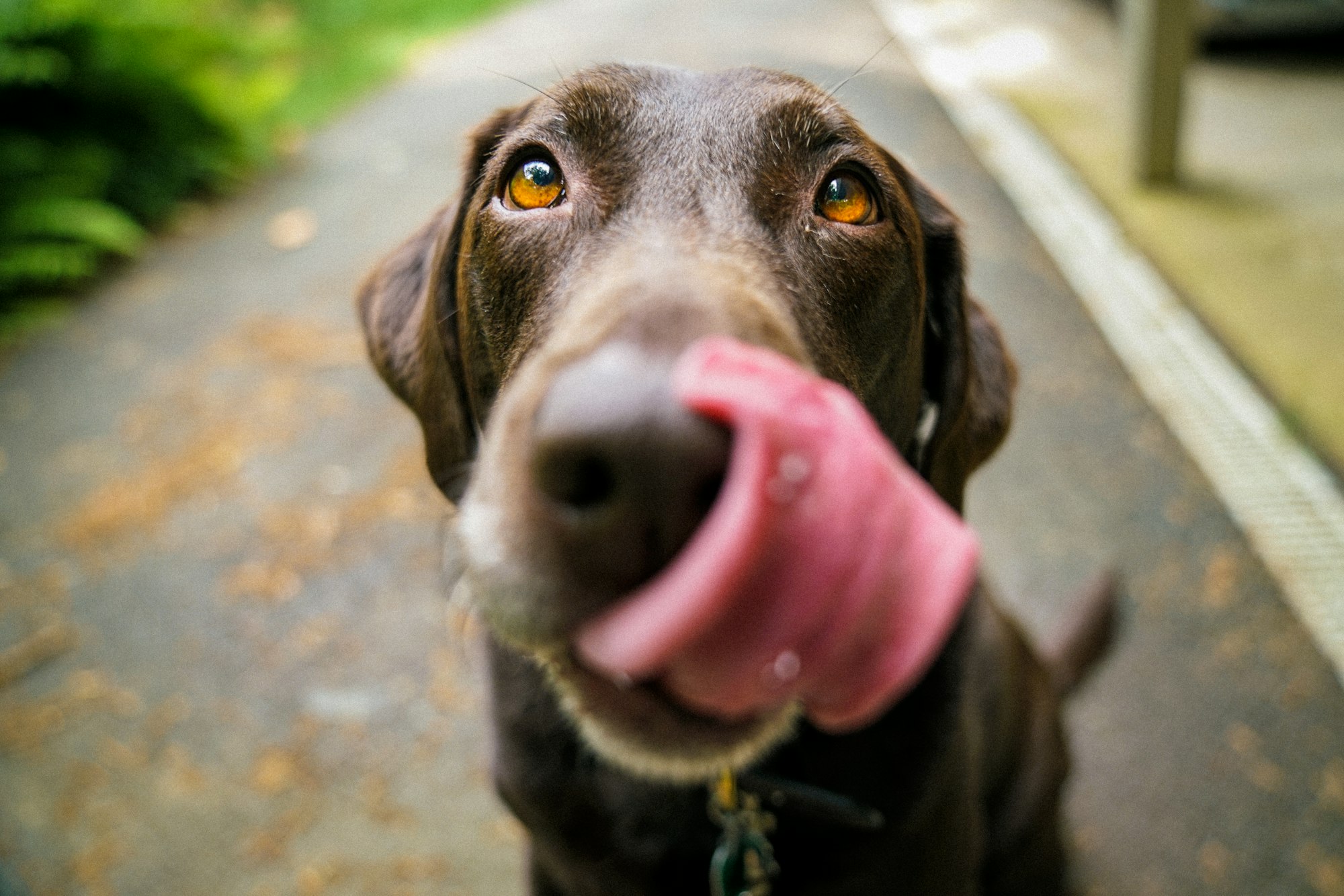Does your pup seem like they can’t get enough fresh air? Wondering why fido appears to be constantly breathing heavily or panting excessively for no apparent reason? If so, you’re not alone – dog panting is a widespread behaviour that many dog owners have had the chance to observe. Dog panting is a natural activity and quite normal if done in moderation. However, it’s also essential for pet parents to understand why their four-legged companions are engaging in this behaviour, as sometimes there may be underlying medical issues. In this post, we’ll discuss what causes dogs to pant and offer tips and remedies on how owners can limit excessive panting in their furry friends.
Common Reasons for Panting on Dogs
Dog panting can be a concern for pet owners, but it’s a natural and essential way for dogs to regulate their body temperature. Here are some things to keep in mind about dog panting:
- Heat Stress: Dogs release heat by panting but can experience heat stress when the temperature or humidity is too high. This condition is more common in breeds with a flat face or short nose, such as bulldogs and pugs. If you notice heavy panting, drooling, or reddened gums and tongue, these could be signs of heatstroke. In such cases, move your dog to a calm, shaded area, and offer water. You may also wet your dog with cool water and place a fan nearby to improve air circulation. If the symptoms persist or are severe, contact your veterinarian for further assistance.
- Stress and Anxiety: Panting can also signify stress, anxiety, or fear in dogs. This behaviour is more common in dogs exposed to loud noises like fireworks and thunderstorms or when separated from their owners. Other signs of anxiety may include pacing, whining, or trembling. To help your dog feel more relaxed, create a safe and comfortable space in a quiet room or crate. You can also use pheromone diffusers or calming supplements recommended by your veterinarian.
- Pain and Discomfort: Dogs in pain or discomfort often pant to cope with their situation. Some underlying causes of pain include injury, arthritis, dental problems, or gastrointestinal issues. If your dog is panting continuously, shows signs of discomfort, or has difficulty moving, seek veterinary attention. Your veterinarian may request blood tests, x-rays, or other diagnostic procedures to determine the underlying health concern.
- Respiratory Problems: Dogs with respiratory problems, such as asthma, bronchitis, or heart disease, may pant more frequently than usual. This behaviour is often accompanied by coughing, wheezing, or difficulty breathing. If you suspect your dog has a respiratory problem, contact your veterinarian, who may prescribe medication or other treatments to relieve your dog’s symptoms.
- Cushing's Disease: Cushing's disease is a common condition in senior dogs caused by excess cortisol levels. Symptoms include excessive panting, excessive thirst, a pot-bellied appearance, and thinning skin and fur. If you notice these signs, consult your veterinarian for diagnosis and potential treatment options.
- Excitement and Physical Exertion: Panting is normal during exercise or when your dog is excited or stimulated. However, if your dog has a pre-existing condition, such as heart disease or obesity, excessive panting could be harmful. Constantly monitor your dog’s physical activity and know your pet’s limits. Gradually increase the intensity and duration of exercise to avoid overexertion.

10 Warning Signs to Look for When Your Dog is Panting
When your furry friend starts panting heavily, paying attention to their behaviour is essential to ensure it’s not a warning sign of an underlying medical issue. Here are ten common warning signs:
- Dehydration: Dehydration can cause excessive panting in dogs. If your dog is panting, and you notice that its gums are dry or its skin is not as elastic as usual, it may be dehydrated. Ensure your dog stays hydrated by providing clean water for them to drink and adding water to their food.
- Heatstroke: Dogs can quickly overheat when exposed to high temperatures, leading to heatstroke. You should never leave your dog in the car during hot weather, even if you leave the windows open slightly. If your dog is panting excessively and appears hot and bothered, move them to a more relaxed environment and offer plenty of water.
- Obesity: Overweight dogs are more prone to breathing problems, and panting is one sign that they struggle to breathe. If your dog is overweight and panting excessively, you should speak to your veterinarian about a weight loss plan.
- Pain or Discomfort: If your dog is in pain, it may pant excessively. You should pay attention to other signs, such as limping or reluctance to move, that may indicate an underlying health problem that requires medical attention.
- Anxiety or Fear: Dogs can pant excessively when feeling anxious or afraid. If your dog’s panting is accompanied by trembling or attempts to hide, they may be scared. In such situations, it is essential to reassure and comfort your furry friend.
- pneumonia or Bronchitis: Respiratory diseases such as pneumonia or bronchitis can cause coughing and panting in dogs. If your dog’s panting is accompanied by coughing and wheezing, you should immediately take them to a veterinarian.
- Heart Problems: Heart problems such as congestive heart failure can cause panting in dogs. If your dog is experiencing difficulty breathing and panting excessively, you should seek medical attention immediately.
- Internal Bleeding: Excessive panting can indicate internal bleeding in dogs that usually results from trauma or injury.
- Cushing’s Syndrome: Cushing’s syndrome is a hormonal disorder caused by too much cortisol, which can lead to excessive panting in dogs. Other symptoms may include increased thirst and appetite, hair loss, and muscle weakness. Identifying the root cause and providing appropriate treatment is necessary to manage the condition.
- Poisoning: Panting can be an early sign of poisoning in dogs. If you suspect your dog has ingested something poisonous, you should seek veterinary attention immediately.

Why the Fi Dog Collar is a Must-Have for Monitoring Your Dog's Panting and Activity
As you observe your dog's panting, whether due to excitement, heat, or discomfort, consider enhancing their safety with the Fi Dog Collar. This advanced collar, equipped with a GPS tracker and geofence feature, ensures you always know where your beloved pet is, giving you peace of mind during your outdoor adventures or even at home.
The Fi app also allows you to monitor their activity levels, ensuring they're getting the exercise they need without overdoing it. Try the Fi Dog Collar today and make your dog's health and safety a top priority, ensuring they continue to thrive and bring joy to your life.
Tips to Help Prevent Unnecessary Panting
Panting is a natural behaviour for dogs, but it can also signal that something is wrong. To help prevent unnecessary panting in your furry friend, here are some tips to consider:
- Provide Adequate Water Supply: Water is essential in regulating your dog’s body temperature. Ensure you always provide clean drinking water for your furry friend, especially during hot weather. If you’re travelling, carry enough water to keep your dog hydrated. You can also give your pet water-rich fruits such as watermelon and apples.
- Keep Your Dog Cool: Heatstroke is a severe medical condition that can lead to death in dogs. Keep your dog cool during summer by providing a cool, shaded resting area. You can also use a cooling mat or dog bed to help regulate their body temperature. Never leave your dog in a parked car, even with open windows, as this can cause life-threatening heat stroke.
- Maintain a Healthy Weight: Overweight dogs are more prone to excessive panting as their bodies will have to work harder to maintain their body temperature. Ensure you feed your dog a balanced diet and regularly exercise them to maintain a healthy body weight. You can consult your veterinarian for a nutrition plan and exercise routine suitable for your furry friend.
- Train Your Dog to Stay Calm: Stress can lead to unnecessary panting in dogs. You can train your dog to stay calm by managing its environment. Avoid leaving them alone for long periods, and provide stimulating toys to help keep them entertained. You can also use calming aids such as pheromone sprays and supplements to help relax your dog.
- Regular Check-Up with Your Veterinarian: Excessive panting can signify a severe medical condition such as heart disease, respiratory problems, or an allergic reaction. Regular check-ups with your veterinarian, who is trained in veterinary medicine, can help identify and manage underlying health conditions in your dog. Don’t wait until your dog shows signs of illness; preventive care and professional advice in veterinary medicine are crucial in maintaining your furry friend’s well-being.

How to Tell If Your Dog is Panting Due to Pain, Injury, or Heart Disease
Panting is a natural behaviour for dogs, but it can also signal that something is wrong. If your dog starts panting excessively or in situations where they didn't before, it could indicate potential health problems. To help prevent unnecessary panting in your furry friend, here are some tips to consider:
- Observe Your Dog’s Body Language: It is important to closely observe your dog’s behaviour and body language to determine whether they are in pain. If your dog is panting but also trembling, shaking, hunching over, or avoiding putting weight on a certain leg, it may indicate pain. Other signs of pain include reluctance to move or engage in activities they normally enjoy.
- Check for Swelling or Injuries: If you suspect your dog is in pain, examining them for any signs of injury or swelling is important. Check for cuts, bruises, or swelling around the joints and legs. Watch for limping or other signs that your dog may favour a particular area.
- Monitor Breathing: While panting is a normal response for dogs, excessive panting can indicate poor breathing. If your dog appears to be taking shallow breaths or has difficulty breathing, this may be a sign of pain and discomfort. Watch closely to make sure they are breathing evenly and easily.
- Consider the Environment: Dogs can also pant due to their environment, so it is important to consider whether other factors, such as heat or stress, may cause it. If your dog is panting due to environmental factors, it may display other signs of discomfort, such as excessive drooling or lethargy.
- Seek Professional Help: If you suspect your dog is in pain or has suffered an injury, it is important to seek professional help. Your veterinarian can help to diagnose any underlying issues and provide the necessary treatment. They may also recommend specific medications or therapies to help your dog manage pain or discomfort.
Natural Home Remedies for Treating Excessive Panting in Dogs
If you have noticed your dog panting heavily for extended periods, it may be time to provide some relief. Here, we will explore natural home remedies to help alleviate excessive panting in dogs:
Ensure Adequate Hydration
The most natural and effective way to relieve panting in dogs is to ensure they remain hydrated. When a dog pants excessively, it can lead to dehydration, exacerbating the issue. Make sure your dog has access to fresh, clean water at all times and encourages them to drink frequently. If your dog is not keen on drinking water, add chicken broth or water to their food to keep them hydrated.
Use Herbs
Certain herbs can help reduce panting in dogs. These herbs incorporate thyme, chamomile, and valerian root. Thyme has calming properties that can reduce stress and anxiety in dogs. Chamomile tea is commonly used to help promote relaxation in both humans and dogs. It can effectively reduce the panting associated with anxiety or nervousness. Valerian root is known to have natural soothing properties, which can help calm down an over excited or anxious dog.
Provide Cool and Fresh Air
Panting in dogs is often a result of heat, which can make them uncomfortable. Providing adequate ventilation and a cool breeze can help alleviate panting. Ensure that your dog's environment is well-ventilated, with fresh air circulating. You can use fans and air conditioners or create a draft through open windows. This can help reduce overheating, alleviating the need for excessive panting.
Use Essential Oils
Essential oils have calming and therapeutic properties that can reduce stress and anxiety in dogs. Using lavender and peppermint oil can keep your dog calm and relaxed, reducing rapid breathing and panting. Mix a few drops with a carrier oil like coconut oil and gently massage your dog's paws, chest, and ears to use essential oils. Ensure your oil is safe for dogs, and dilute it appropriately before applying it.
Monitor Your Dog's Diet
Some dog breeds are prone to panting more than others. Feeding your dog a balanced and nutritious diet can help reduce excessive panting. Foods rich in omega-3 fatty acids, such as fish, can help reduce inflammation and promote a healthy coat, lowering the need for panting. Also, avoid feeding your dog heavy and dry foods that increase body temperature and thirst.
When to Call a Vet If Your Dog's Panting is a Cause for Concern
Our furry four-legged friends can’t speak, so we must interpret their behaviour and know when to call in the professionals. Panting is a common behaviour among dogs but can also be a sign that something is wrong. For senior dogs, excessive panting can be linked to health issues such as respiratory diseases, canine cognitive dysfunction, and Cushing's disease. It could indicate an underlying health issue if your dog is panting excessively or struggling to catch their breath. Other symptoms to look out for include lethargy, loss of appetite, and difficulty standing or walking. Don’t hesitate to call your vet if you notice any of these symptoms. Being cautious about our beloved pets’ health and well-being is always better.

Conclusion
All in all, it's important to remember that panting is a normal and healthy process. Recognizing when your pup's breathing needs to be monitored is a key part of being a responsible pet owner. If your dog exhibits consistent and/or unusual panting behaviour, it could indicate an underlying medical problem, so don't hesitate to check with your veterinarian if you're concerned. And if the issue isn't severe enough for you to bring your pup in immediately, monitor their breathing and behaviour closely. Your furry family member will thank you. Every dog parent wants what's best for their four-legged companion - ensuring they have a healthy life full of happiness for years to come.






